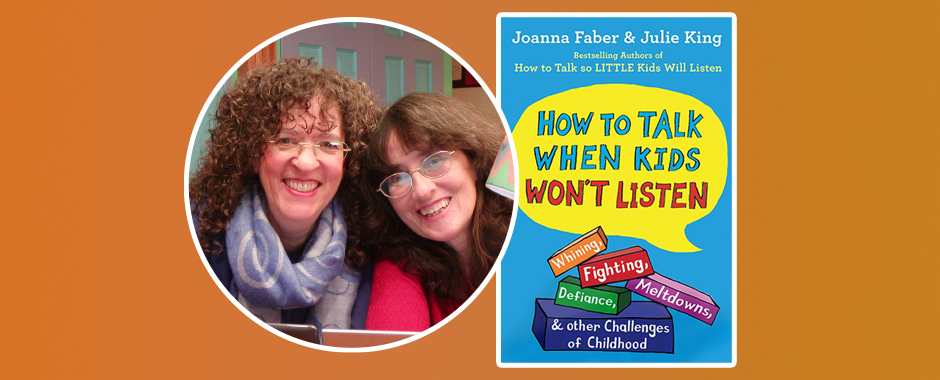With our upcoming event with bestselling authors, Joanna and Julie, around the corner, we sat down to ask them a few burning questions about their new book.
Why did you write this book?
After we wrote How To Talk So LITTLE Kids WIll Listen, we received emails from parents all over the world sharing stories of how they used the communication tools with their kids. They also asked questions that hadn’t been directly addressed in our book—about how to handle conflicts over screen time, pets, name calling, divorce, and many more. How To Talk When Kids Won’t Listen is a combination of stories from real parents and a sort-of advice column where we publish the actual letters and our answers. We also added interactive material—exercises and quizzes for those who want another way to practice.
What it boils down to is, it’s one thing to know the theory. It’s another thing to put that theory into practice, in the moment, under stress. It’s enormously helpful for parents to hear how other people have used these strategies in a variety of situations.
Why is it so hard to get kids to listen?
As parents we tend to get caught up in managing our kids because there are so many things we have to get them to do … and to STOP doing! So we have to remind ourselves to step back from our managerial roles and reconnect with our kids as human beings. How would you react if every time you saw me coming you knew that I was going to try to make you do something you don’t want to do? You’d flee at the sound of my voice!
It turns out that if we spend a little more time listening to our kids it actually makes them feel like listening to us. We offer concrete tools parents can use to move from conflict to cooperation
Why can’t we just use the same approach that our parents and grandparents used? Isn’t it all common sense?
Well, in the old days, it was much more acceptable to use force. If your kids didn’t do as you say, you’d give ’em a good smack!
Nowadays we have overwhelming evidence that using force is counterproductive in the long run. It turns out that kids who are harshly disciplined are more likely to be aggressive with other kids, they’re more likely to act out in school, to have depression and anxiety, the list goes on.
Even the more gentle punishments often don’t result in better behavior. Grounding kids and taking away privileges often ratchets up the resentment and hostility between adults and children instead of giving kids the skills and strategies they need to resolve whatever conflict started the whole thing.
So we need new ways to communicate. And luckily there are better ways that result in less conflict and better behavior!
Join the Center for Children and Youth for a FREE community event with Joanna Faber and Julie King on Tuesday, August 31, 2021 from 1:30 – 2:30 pm about How to Talk When Kids Won’t Listen: Whining Fighting, Meltdowns, Defiance, & Other Challenges of Childhood.
Joanna Faber and Julie King are the authors of the new book, How To Talk When Kids Won’t Listen: Whining, Fighting, Meltdowns, Defiance, & Other Challenges of Childhood, as well as the best-selling book, How To Talk So Little Kids Will Listen: A Survival Guide to Life with Children Ages 2-7, which has been translated into 22 languages world-wide. They created the app HOW TO TALK: Parenting Tips in Your Pocket, a companion to their book, as well as the app Parenting Hero. Together they speak to schools, businesses and parent groups nationally and internationally, they lead “How to Talk” workshops and support groups online and in person, and provide private consultations. Visit them at How-To-Talk.com, on Facebook @faberandking or on Instagram @howtotalk.forparents.



